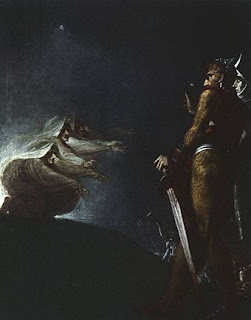And now, to start with the letter B, we will introduce Macbeth's friend and sidekick, BANQUO, THANE OF LOCHABER.
First of all, if this isn't the first time that I've said that you cannot rely on the Bard for historical accuracy, then I'm saying it now. It is true that there really was a Scottish king called Macbeth. He ruled from 1040 - 1057 and that he was killed in battle after succeeding Duncan. However, whatever WS wrote about Macbeth's fellow general and buddy, Banquo IS ALL LIES! Banquo never existed even if Macbeth, Duncan, Malcolm and Donalbain really did.
Banquo first came onto the 'historic' scene in 1527 when he was first mentioned in Hector Boece's Scoturum Historiae. Boece was a philosopher, historian and the Principal of King's College, Aberdeen. His history book was the source for Raphael Holinshed's Chronicles, (1587 edition) which in turn became the source for WS's Scottish play, Macbeth.
Macbeth and Banquo meeting the Witches by Fuseli
It has also been suggested that the Bard decided to keep Banquo in the play, either because he thought that he really existed and/or he wished to stroke the new king, King James I (VI of Scotland)'s ego. This was because it was this king who was was the patron of Shakespeare's new actors' company. (See previous blog.) In fact, the king saw himself as one of the kings who the Three Witches, after stirring up their foul broth which included an eye of newt and toe of frog, promised would reign in the future.
In terms of the play, Macbeth, Banquo is usually seen as a counterweight to Macbeth's ambitious scheming. At the beginning of the play he is shown as a victorious general who, together with Macbeth have just defeated the Norweyan (Norwegian) enemy. Then on their way home they come across the three Witches. In contrast to Macbeth being captivated by their promises, Banquo's feet stay firmly on the ground.
Macbeth and Banquo meeting the Witches.
If you can look into the seeds of time, he challenges the Witches,
And say which grain will grow and which will not,
Speak, then, to me, who neither beg nor fear
Your favours nor your hate.
As the play unfolds, he continues to remain sceptical of the Witches and their promises and even warns Macbeth of future evil actions. Apart from Macbeth, Banquo is the only other character in the play who knows of the Witches and he is not really sure if his fellow general became king through fair means or foul.
Thou hast it now, he wonders in Act III.i, king, Cawdor, Glamis, all
As the weird women promis'd, and, I fear,
Thou play'st most foully for 't...
Banquo is murdered as Fleance escapes
And of course, this is why Banquo has to die. He is the only one who has understood how Macbeth gained the throne. Later in the same Act he is murdered by Macbeth's henchmen, but then his ghost returns to haunt Macbeth at his celebration banquet.
Banquo's final appearance in the play is when his spirit rises after Macbeth insists that the Witches show him his future. There he sees the ghost of Banquo, 'the father of kings' taunt him as his (Banquo's) sons become the future kings of Scotland while Macbeth's possible dynasty will die with his own death.
However, even though Banquo is physically removed from the scene, his soul continues to exist. His son, Fleance, escapes the murderous scene and so becomes the forerunner of a line of kings, just as the Witches promised.
Historical note: The eight kings the Witches refer to are Robert II, Robert III and the six Jameses. James I of England was the last King James, i.e. the sixth of Scotland.
Another occasion where Banquo's behaviour is severely contrasted with Macbeth's occurs at the beginning of Act II. During a foul night when all manner of supernatural events occur, Banquo, who is feeling restless, gives his sword and dagger to his son, Fleance. Some critics have said that this is because, as Macbeth's close friend, he though he would help Macbeth fulfill the Witches promise and kill the sleeping King Duncan. However, when Macbeth approaches him, he asks for Fleance to return his weapons because he is now afraid of Macbeth.
Robert Shaw as Banquo (1970) in Hugh Heffner's film "Macbeth."
Since Shakespeare wrote Macbeth, probably in 1606 to keep King James happy about having a Scottish play which also featured witches, one of the king's favourite topics, it has become one of the most staged WS play of all. Directors have loved to interpret Act III iv where the ghost of Banquo appears at the feast to unsettle the newly crowned King Macbeth and his ever-ambitious wife. The ghost has appeared through different technical effects or through the actor walking on stage or by being half-hidden by the banquet table until he is spotted by Macbeth. In a 1990 version, the play was transformed to take on a Mafia-style approach and Banquo was renamed Bankie Como and acted by Dennis Farina.
The next blog will deal with another B, or rather a pair of them: Beatrice & Benedick from "Much Ado About Nothing."
Note: For those who do not know of my non-Shakespearean writing, you are invited to look at my website:
dly-books.weebly.com Thank you.
would be the descendentse









No comments:
Post a Comment